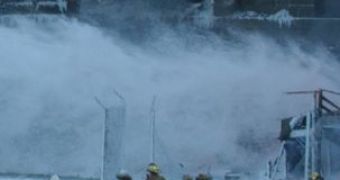A recent study showed that rescue workers that helped extinguishing the fire and saving some people lives in the tragic massacre that occurred on September 9, 2001 might have been affected by the thick dust layers around the place.
Paramedics and firemen that assisted the collapse of the World Trade Center have had their lung tests investigated by the researchers and the thorough analyses showed that their lungs have really been affected by the smoke and dust at the massacre place. The medical team from the Montefiore Medical Center in New York investigated the health data of about 12,000 rescuers that helped when the terrorist attack occurred were. Results showed that they have lungs disorders similar to 12 years of respiratory decline.
The rescuers that arrived at the accident place immediately after the hi-jacks crashed into the tower were found to have more serious lung problems than the ones that came 2 days after in order to clean the place. It was rather easy for the research team to investigate the respiratory data of the 9/11 rescuers, because the firefighters have been routinely tested once in 18 month since 1997.
Dr Gisela Banauch, who conducted the study, stated: "We were in a very unique position because these workers had had routine monitoring of their lung function before and that's never happened before in a group this large. My personal opinion is that when the towers collapsed a lot of building materials were pulverized so there was a lot of cement in the dust, which is very alkaline and which we know that causes burns."
Some of the lung disorders caused by dust to the rescuers consist in irritation of the respiratory ways and other more long-term effects. "So far, the two most common respiratory diagnoses have been reactive airways dysfunction syndrome (RADS) and irritant-induced asthma. For a significant number of workers, unfortunately, this has affected their ability to work," lead researcher of the study pointed out.

 14 DAY TRIAL //
14 DAY TRIAL //